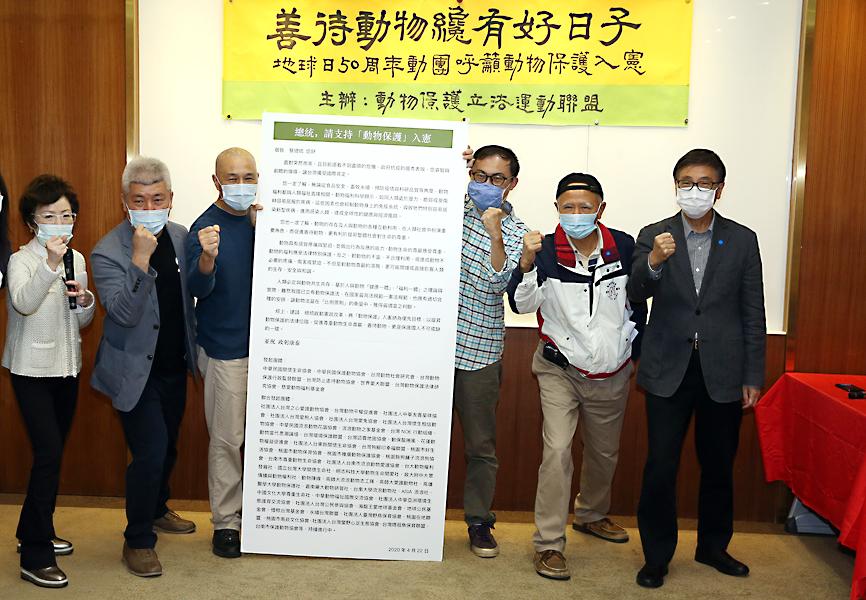Animal rights advocates yesterday urged President Tsai Ing-wen (蔡英文) and lawmakers to enshrine the protection of animals in the Constitution, saying that existing laws are insufficient to stop the abuse of animals.
The advocates from different groups in February established an alliance to promote animal protection legislation, including by adding clauses on the protection of animals to the Constitution.
On the 50th anniversary of Earth Day yesterday, members of the alliance reiterated their demands at a news conference at the Legislative Yuan in Taipei.

Photo: CNA
“There is only one Earth, and the health of humans and animals on the planet are interconnected,” Taiwan Animal Protection Monitor Network chairman Wang Wei-chi (王維治) said.
The alliance has written a letter to Tsai calling for a constitutional amendment to promote animal welfare, Environment and Animal Society of Taiwan executive director Wu Hung (悟泓) said, adding it would not impose a ban on the use of animals, just prevent their abuse.
“Whether it is from the perspective of food security, sustainable husbandry, disease prevention or scientific research, animal welfare is directly related to human welfare,” the letter states. “Just like humans are more vulnerable to diseases when they are under stress, or become weaker or injured, animals are more likely to be infected by new types of disease when their immune systems are affected by those factors.”
“Animals are able to feel pain and pressure, and respond to such stimuli. Their dignity of life should be respected and their welfare should be legally protected,” it states.
While the Animal Protection Act (動物保護法) imposes penalties on people who abuse animals, the effectiveness of the act is often undermined by other regulations, which shows the need to add clauses on animal protection to the nation’s highest law, the Constitution, Wu Hung said.
Amid the COVID-19 pandemic, people protect each other by social distancing, but animals are kept in crowded cages that can be hotbeds of other viruses, he said.
The alliance yesterday met with the legislative caucus of the Taiwan People’s Party, which was the first political party to respond to their demands, Taiwan Animal Protection Monitor Network secretary-general Ho Tsung-hsun (何宗勳) said.
The alliance also plans to arrange meetings with the caucuses of the Chinese Nationalist Party (KMT), the New Power Party and the Democratic Progressive Party, Ho said.

A preclearance service to facilitate entry for people traveling to select airports in Japan would be available from Thursday next week to Feb. 25 at Taiwan Taoyuan International Airport, Taoyuan International Airport Corp (TIAC) said on Tuesday. The service was first made available to Taiwanese travelers throughout the winter vacation of 2024 and during the Lunar New Year holiday. In addition to flights to the Japanese cities of Hakodate, Asahikawa, Akita, Sendai, Niigata, Okayama, Takamatsu, Kumamoto and Kagoshima, the service would be available to travelers to Kobe and Oita. The service can be accessed by passengers of 15 flight routes operated by

GIVE AND TAKE: Blood demand continues to rise each year, while fewer young donors are available due to the nation’s falling birthrate, a doctor said Blood donors can redeem points earned from donations to obtain limited edition Formosan black bear travel mugs, the Kaohsiung Blood Center said yesterday, as it announced a goal of stocking 20,000 units of blood prior to the Lunar New Year. The last month of the lunar year is National Blood Donation Month, when local centers seek to stockpile blood for use during the Lunar New Year holiday. The blood demand in southern Taiwan — including Tainan and Kaohsiung, as well as Chiayi, Pingtung, Penghu and Taitung counties — is about 2,000 units per day, the center said. The donation campaign aims to boost

ENHANCING EFFICIENCY: The apron can accommodate 16 airplanes overnight at Taoyuan airport while work on the third runway continues, the transport minister said A new temporary overnight parking apron at Taiwan Taoyuan International Airport is to start operating on Friday next week to boost operational efficiency while the third runway is being constructed, the Ministry of Transportation and Communications said yesterday. The apron — one of the crucial projects in the construction of the third runway — can accommodate 16 aircraft overnight at the nation’s largest international airport, Minister of Transportation and Communications Chen Shih-kai (陳世凱) told reporters while inspecting the new facility yesterday morning. Aside from providing the airport operator with greater flexibility in aircraft parking during the third runway construction,

American climber Alex Honnold is to attempt a free climb of Taipei 101 today at 9am, with traffic closures around the skyscraper. To accommodate the climb attempt and filming, the Taipei Department of Transportation said traffic controls would be enforced around the Taipei 101 area. If weather conditions delay the climb, the restrictions would be pushed back to tomorrow. Traffic controls would be in place today from 7am to 11am around the Taipei 101 area, the department said. Songzhi Road would be fully closed in both directions between Songlian Road and Xinyi Road Sec 5, it said, adding that bidirectional traffic controls would